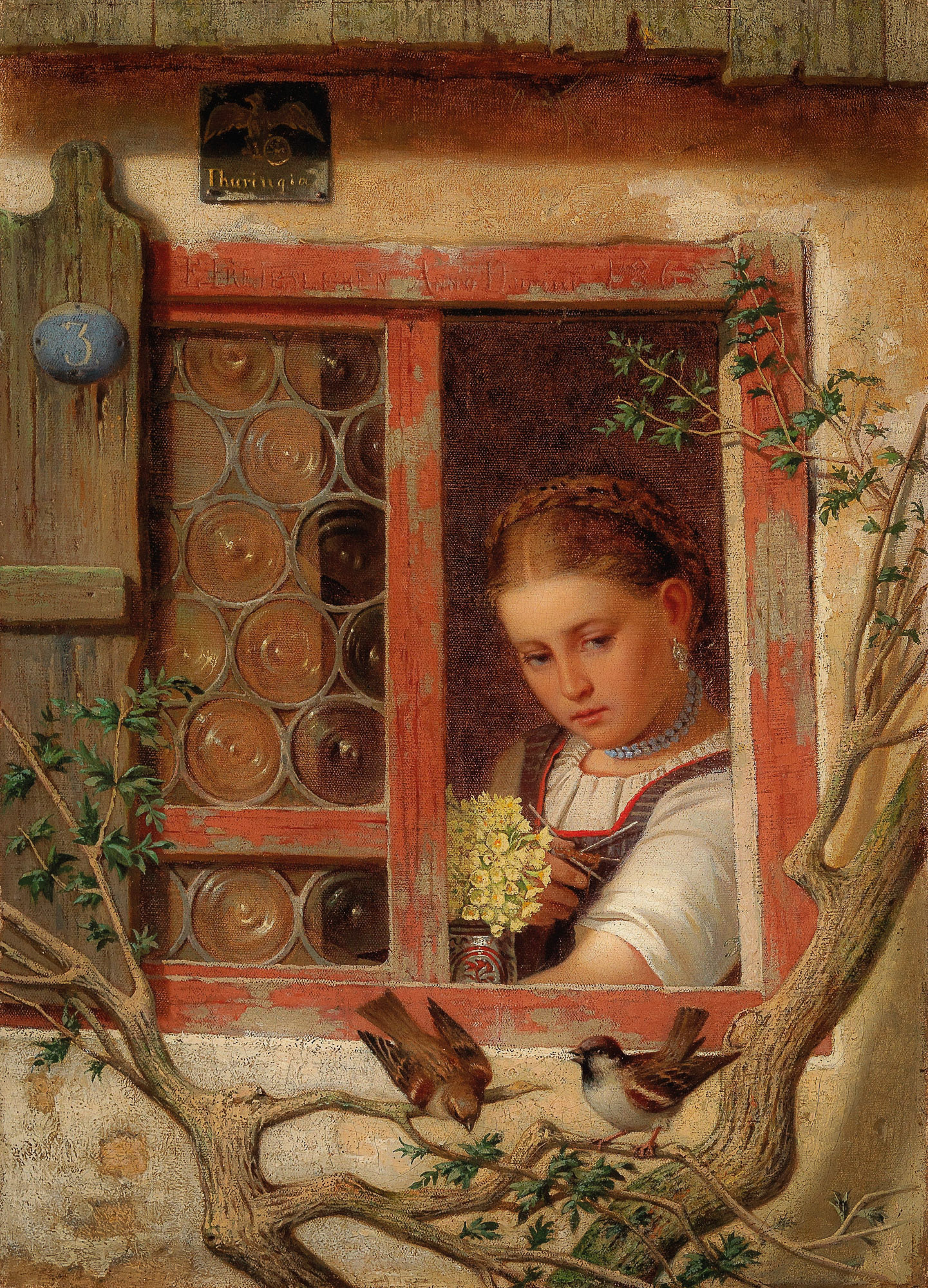
Praying With the Birds
Miss Rachel Shrader

I am convinced that every human being should have a hobby he’s completely fanatical about.
A person needs a hobby that draws him totally outside himself, that commands his attention so thoroughly that he has no chance to slip into meditations on his own feelings, problems, and sorrows. Engaging in this hobby, he remains, in fact, completely untouched — if just for a few moments — by these problems; for just a few moments, they do not infect his thinking, and he is able to use his mind for what it was meant for: the contemplation of the marvelous.
Now, over-meditating on one’s own difficulties is, admittedly, more common among over-sensitive artistes such as myself, but for the rest of you, I would recommend the practice nonetheless. All of us, as members of the fallen human race, tend to spend too much time wallowing in our problems.
For me, the hobby is birdwatching. Watching wild birds takes me outside of myself like nothing else can, for a few different reasons.
The first is that the commonest backyard birds are simply magnificent. They fly — fly! It took humans millennia to figure out how to do that, but birds were made for it and (to my way of thinking) do it much better than we ever will. If the mere fact of flight doesn’t impress you, at least try to be impressed by the fact that all flighted woodland birds travel at an average speed of about twenty to thirty miles per hour and never hit a twig.
Perhaps even more awe-inspiring than flight, birds sing. And unlike us humans, who vary in our musical abilities from zero to Mozart, all songbirds have an innate gift for it, each one born with a song to sing, each one learning to sing it impeccably. And we, along with the rest of the natural world, get to wake in the morning to the gentle symphony of their melodies, which they are kind enough to offer at that early hour when we need some help to shake off the sleep.
Even those of us who do play music regularly are — or ought to be — humbled by the birds. Nothing we do will ever be as lovely as the sound of a Carolina Wren or a fall warbler, and they do it with such ease, consistency, and precision and with relatively little training or practice. As painters are always humbled by the land- and skyscapes God created, so too, at least for me, is it humbling to know how much chicken-scratch human musical efforts are compared to the work of the divine.
But there is another aspect of birdwatching that inhibits navel-gazing, that great destroyer of human happiness. This aspect is the denial of self that must take place in order to really get anywhere with such an otherwise frustrating hobby.
Simply stated, you can’t put yourself first and expect to have any meaningful interaction with a wild bird, or, for that matter, any wild animal. It is a fact that separates our interactions with wild animals from those we have with domestic ones.

Simply stated, you can’t put yourself first and expect to have any meaningful interaction with a wild bird, or, for that matter, any wild animal.

Domestic animals are dependent on us and hence have a natural connection to us. They do as we say and if they don’t, we can train them to do so. We generally need not take into account any inborn fear of humans that might affect how we speak or act around them. In return for our care and kindness, domestic animals give us the satisfaction of companionship or at least some kind of product we can use.
Wild animals, conversely, have no such connection to and no such need for us. They are just fine without us, as humbling as that is, and (humbling again) many of them are poised higher up on the food chain than we are. Our superiority to them as humans really doesn’t do us much good, as our will and pleasure are irrelevant to them. They either flee from us or kill us if we start making demands of them. They are never — outside of unusual circumstances — going to be our companions.
In short, it’s a lot easier to get something out of a relationship with a domestic animal than it is with a wild one. Domestic animals satisfy natural needs. Wild animals, you might say, speak to spiritual ones. Nothing reflects the divine quite like beauty we can’t touch, beauty that is, in a sense, beyond us and that reacts rapidly and negatively to any impulsive exercise of our passions or any misplaced attempt to grasp at it.
To go back to birdwatching: if you’re trying to observe a bird and you move too quickly because you aren’t patient enough to move slowly (or just stay relatively still for a while), the bird is going to fly away.
If you try to move close to it, not out of prudence but out of impatience, it’s going to fly away.
If you only spend five seconds contemplating a hawk in flight because only really strange people spend more time than that observing birds, your life isn’t going to change much (because positive change doesn’t happen when it’s motivated by what other people think).
If you approach a wild bird with any notion that you deserve some kind of memorable experience, you are nine times out of ten going to be disappointed.
Any self-reference in our actions has to go away.
If it does, and we approach birds because they are wonderful and we find their presence in our world an immense gift, our experiences will always be positive.
And if something like a bird really captures us with its beauty, we will find a way to pursue it that is suited to its nature (rather than ours). If we really want to go beyond everyday experience and truly draw closer to this beauty, we will do what it takes to approach it — even to the point of seriously denying our own natural tendencies. And if we do deny ourselves — our impatience, our expectations, our demands, our distraction — then, perhaps, we’ll get a glimpse of something unforgettable.
One of my unforgettable moments came when I was a child. I read in a kids’ nature magazine the proper methodology for feeding a wild bird from the hand. As the article recommended, I took down the bird feeders and sat there with seed in my hand. I can’t remember how long I stayed there (and admittedly I got impatient with the “put seed in a cup” phase and skipped straight to putting the seed in my palm). But sure enough, I was blessed with a visit from a chickadee (a naturally bold and spunky species), who landed on my fingertips and took a seed. That was about twenty-five years ago, but I remember it so well. A bird in the hand really was worth two — maybe ten — in the bush.
But even the birds in the bush have plenty to share if you take the time to look. To see diminutive Ruby-Crowned Kinglets dropping deftly among the branches of a cedar tree (stay a moment and see how close they come!); to search the camouflaging bark of a hickory to see the rare and wonderful Brown Creeper; to find yourself within feet of an energetic Blue-Gray Gnatcatcher (with its amusing angry-bird eyebrows) and realize what an undeserved gift it is; to pursue the origin of some strange and wonderful new song suddenly breaking through the silence of an afternoon stroll in the forest; to look up on a bad day and feel your spirits rise when you catch the darting glance of an angelic Osprey; all these things offer an experience of uncommon beauty that is more than worth the price of a little self-denial.
Certainly the experience of God’s creation is a way of connecting with him, and for those who love nature, many good conversations with God happen while walking in the halls of the created world. But thinking about my own experiences birdwatching, I realize how close a comparison it bears to actual mental prayer.
I do not propose it is the same thing as prayer, or a replacement for prayer. But birdwatching could be viewed as a sort of training ground for prayer. It is a natural activity that exercises many of the same skills. And, of course, it can coincide with prayer.
To draw a few parallels: both involve the contemplation of an utterly external form of beauty for its own sake. We must approach both with humility and without demands, knowing that our humanity puts us in a strangely poor position to make demands of either a bird or the Supreme Being. Both require the disciplining of our natural impatience, whether that springs from our short attention spans or from those moments — and they happen frequently with both activities — when we feel we are getting “nothing” out of it.

Both require the disciplining of our natural impatience, whether that springs from our short attention spans or from those moments — and they happen frequently with both activities — when we feel we are getting “nothing” out of it.

Both have an unmatched reward. Once you experience what it is like to move beyond fleshly tendencies and encounter beauty on its own terms, you’ll keep coming back for more. You’ll keep feeding that hunger because it’s so much deeper even than material hunger. It’s a hunger of the soul that so many souls today do not even know they have — and that they nonetheless try to alleviate in all the wrong ways.
And both prayer and birds are available to all. Not everyone will feed a wild bird out of the hand, nor will everyone make special trips to Cape May to watch the migrations (I haven’t even done that). One of the glorious things about the birds is that they can be found everywhere — city, suburbia, forest, desert, right outside your kitchen window. They are there for everyone, formal birdwatcher or not.
Similarly, the opportunity for an encounter with God comes to each of us, monastic or not, countless times a day. Prayer is not a privilege or obligation reserved for consecrated religious, most of us being laypeople who can’t dedicate large swathes of time to it. We may have to discipline ourselves, yes; we may have to make the choice to dedicate moments that our frenetic world says are better spent elsewhere. But everyone has a chance at prayer, because who can escape the birds, as the Psalm says, “where can I fly from Your presence”?
As I typed this essay on a Tuesday afternoon, several sparrows came to visit outside the window. I knew I would see many more such creatures before my ordinary day was finished. It goes to show one final parallel between watching the birds and watching God: while we should take time for deliberate and formal prayer, for right worship and proper liturgy, prayer need not always be a grand event. It can be a glance of the heart and the eye, prompted by a moment of silence, or maybe a visit from a sparrow. It should be there in various forms throughout our day, every day, whether worded or wordless, planned or spontaneous. Indeed, if you learn how to see and hear the things that most of the world misses, you’ll find calls to prayer everywhere.

